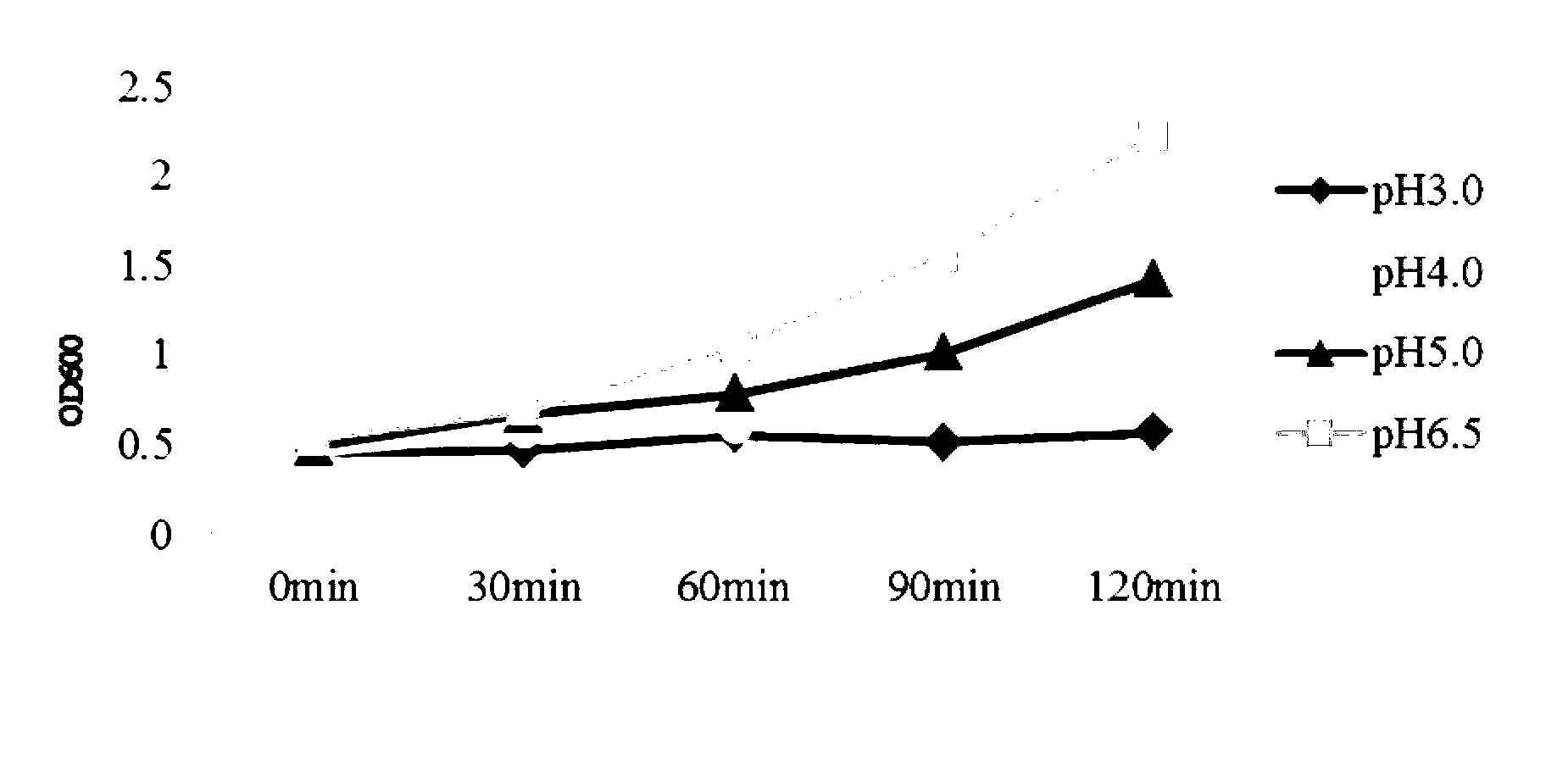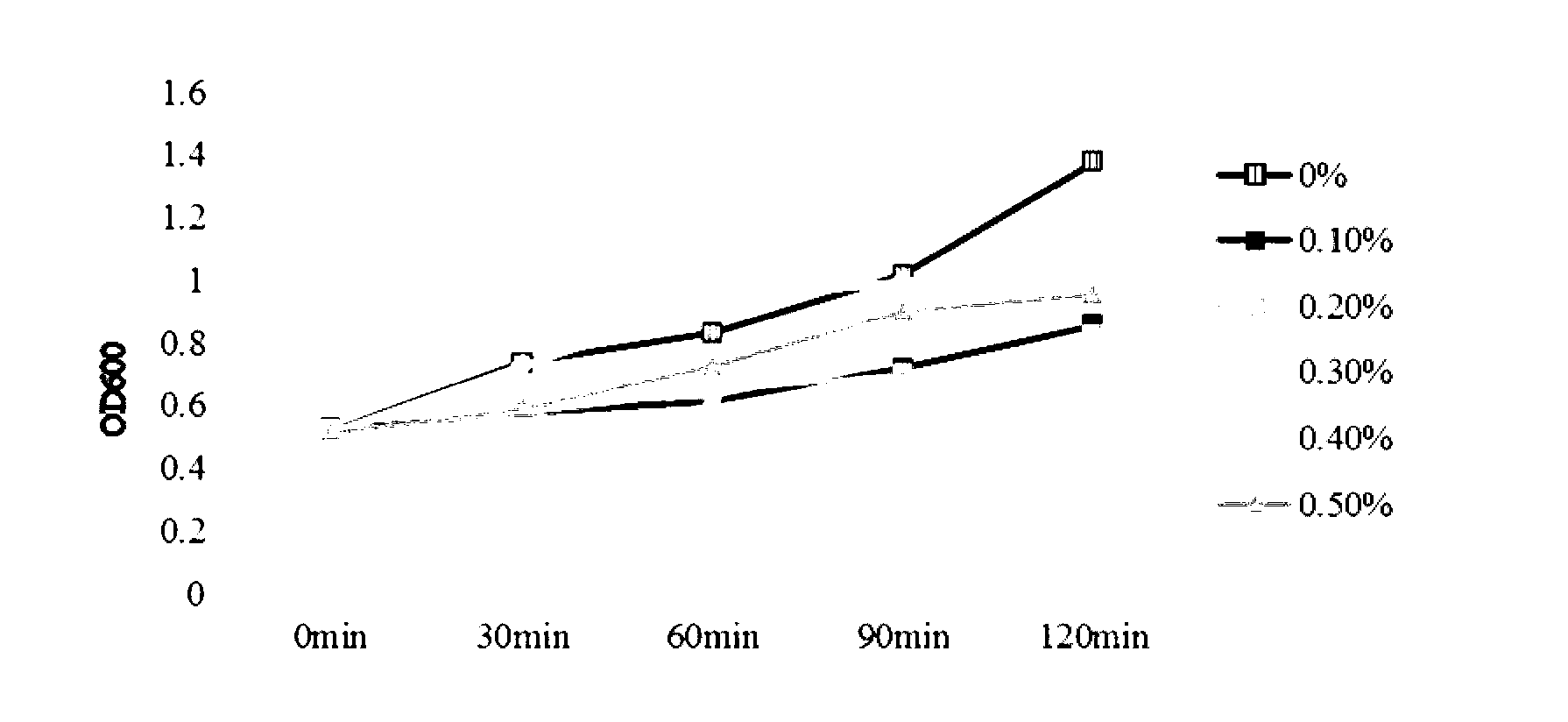Lactobacillus salivarius strain and application thereof
A technology of Lactobacillus salivarius and strains, applied in the field of microorganisms, can solve the problems such as the death of Lactobacillus and the inability of natural Lactobacillus to high temperature
- Summary
- Abstract
- Description
- Claims
- Application Information
AI Technical Summary
Problems solved by technology
Method used
Image
Examples
Embodiment 1
[0022] The isolation of embodiment 1 bacterial strain
[0023] experiment material:
[0024] Test sample: fresh feces from healthy pheasants in the Tianshan Mountains, Xinjiang, China
[0025] Preparation of medium:
[0026] MRS liquid medium: peptone 10g, beef extract 10g, yeast extract 5g, diammonium hydrogen citrate 2g, glucose 20g, Tween-801ml, sodium acetate 5g, dipotassium hydrogen phosphate 2g, magnesium sulfate 0.58g, manganese sulfate 0.25g , distilled water 1000ml, pH value 6.2-6.4, sterilized at 121°C for 15min;
[0027] MRS solid medium: MRS liquid medium is prepared by adding 1.5% agar powder and sterilizing at 121°C for 15 minutes.
[0028] experiment method:
[0029] The collected wild fresh chicken feces were directly inoculated into the MRS liquid selection medium for bacterial proliferation and enrichment, and then inoculated into the MRS solid selection medium, and the colonies with obvious characteristics were picked and separated by streaking repeatedl...
Embodiment 2
[0032] The biochemical identification of embodiment 2 bacterial strains
[0033] Test material: Bovine bile salt Reagent: Oboxing Biotechnology Co., Ltd.
[0034]Use the API50CHL test strip identification system of French Mérieux company to identify the biochemical profile of the strain, and carry out the species identification of the strain according to the biochemical profile (API50CHL is an identification test strip system for Lactobacillus and related bacteria, which is composed of 49 fermentable A test strip composed of API50CH simple medium of carbohydrates. Each small tube of the test strip is inoculated with the suspension inoculated with the measured bacteria. When cultivating, due to the acid production of fermented carbohydrates, the pH drops, causing the indicator to change color. The result constitutes the strain Biochemical map, and used for identification or typing. A total of 49 biochemical identification test strips, a control strip, a total of 50 test strips)...
Embodiment 3
[0039] The species identification of the 16SrDNA of the strain of embodiment 3
[0040] 1 Test material:
[0041] The PCR kit was purchased from TaKaRa Biological Company; the gel recovery kit was purchased from Ai Sijin Biotechnology Co., Ltd.; the primers were synthesized by Boshi Bio Company, using the bacterial domain universal primer 27F as SEQ ID No. 2; 1541R as SEQ ID No. 3.
[0042] Utilize the general primers 27F and 1541R in the bacterial domain, and use the extracted Lactobacillus genomic DNA as a template to amplify the 16S rDNA sequence with a length of 1441bp. The PCR amplification system is 50 μL. The PCR program: 95°C for 5min; 95°C for 45s, 50°C for 1min , 72°C 90s, 10 cycles; 95°C 45s, 58°C 1min, 72°C 90s, 15 cycles; 95°C 45s, 55°C 1min, 72°C 90s, 10 cycles; 72°C 10min, PCR amplification product cut After the gel was recovered, the fragment was cloned into the pMD18-T vector and sequenced by Invitrogen Company. The obtained sequence was more than 99% homolo...
PUM
| Property | Measurement | Unit |
|---|---|---|
| diameter | aaaaa | aaaaa |
Abstract
Description
Claims
Application Information
 Login to View More
Login to View More - R&D
- Intellectual Property
- Life Sciences
- Materials
- Tech Scout
- Unparalleled Data Quality
- Higher Quality Content
- 60% Fewer Hallucinations
Browse by: Latest US Patents, China's latest patents, Technical Efficacy Thesaurus, Application Domain, Technology Topic, Popular Technical Reports.
© 2025 PatSnap. All rights reserved.Legal|Privacy policy|Modern Slavery Act Transparency Statement|Sitemap|About US| Contact US: help@patsnap.com



